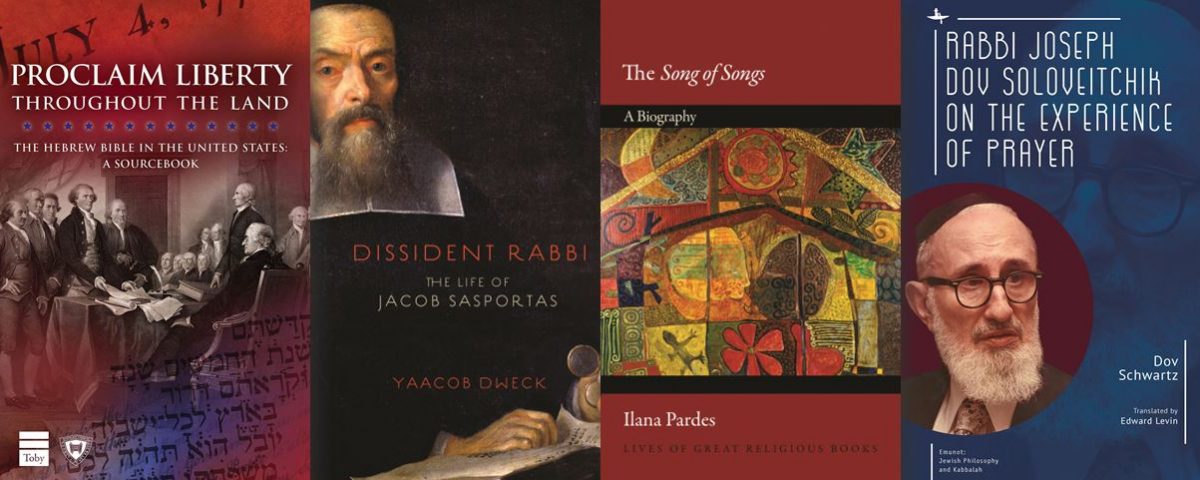New and Noteworthy Books Received

Robert Alter, The Art of Biblical Translation (Princeton University Press)
Acclaimed literary critic Robert Alter offers a personal and passionate account of what he learned about the art of Bible translation over the two decades he spent completing his own English version of Tanakh. The Bible’s style, Alter writes, “is not some sort of aesthetic embellishment of the ‘message’ of Scripture but the vital medium through which the biblical vision of God, human nature, history, politics, society, and moral value is conveyed.” The book demonstrates how the authority of the Bible is inseparable from its literary authority [read chapter 1].
Proclaim Liberty Throughout the Land – The Hebrew Bible in the United States: A Sourcebook, ed. S. Halpern, M. Holbreich, J. Silver, M. Soloveichik (Straus Center for Torah and Western Thought & Toby Press)
This sourcebook assembles foundational documents of American history side by side with the biblical verses that inspired them, and allows the reader to learn how impactful the Hebrew Bible has been on the American idea. The source material, including sermons, letters, and presidential addresses, demonstrate that the American Republic and the entirety of its history has been in intertextual dialogue with the Hebrew Bible, which has served as a primary source of political and cultural vocabulary for the Puritan settlers, revolutionaries, African slaves, leaders of the civil rights movement, and the broader population.
Charles H. Sheer, Maimonides’ Grand Epistle to the Scholars of Lunel: Ideology and Rhetoric (Academic Studies Press)
When Maimonides’ Mishne Torah (Code of Jewish Law) reached Lunel, France, a group of scholars composed twenty-four objections to his positions. This short book offers the first annotated translation of Maimonides’ response. Sheer explicates the content in the context of Maimonides’ other works and compositions of the late Middle Ages and illustrates how Maimonides shared with these scholars his ideological struggle between his love for Torah study and “hokhma” (philosophy, wisdom) [read Preface and Introduction].
Dov Schwartz, Rabbi Joseph Dov Soloveitchik on the Experience of Prayer (Academic Studies Press)
This book is devoted to Rabbi Joseph B. Soloveitchik’s discussions on the practice of prayer. Prayer is analyzed across a broad and complex spectrum in Soloveitchik’s work, and his writings describing and analyzing the experience of prayer afford a profound insight into its diversity, ranging from existential crisis to communion with God. Through a careful reading of R. Soloveitchik’s texts dealing with this topic, the book follows the consciousness of prayer across its various stages until maturity, starting with an analysis of Worship of the Heart, through to Reflections on the Amidah and other writings.
Shmuel Philips, Judaism Reclaimed: Philosophy and Theology in the Torah (Mosaica Press)
Judaism Reclaimed examines a range of theological and philosophical discussions emerging from the weekly Torah portion, analyzing both narrative and halakhic areas of the Torah’s teachings. Drawing on a wide range of sources, the author examines a number of challenges posed to Orthodoxy from the halls of academia and addresses them from the perspective of Jewish tradition.
Yaacob Dweck, Dissident Rabbi: The Life of Jacob Sasportas (Princeton University Press)
This comprehensive biography relates the lasting rabbinic significance of both messianic pretenders and those who risk condemnation by questioning convincing imposters, as Sasportas did with the rise of Sabbatai Zevi. In 1665, the false Messiah, with a mass following throughout the Ottoman Empire and Europe, announced that the redemption of the world was at hand. As Jews everywhere rejected the traditional laws in favor of new norms established by Sabbetai Zevi, and abandoned reason for the ecstasy of messianic enthusiasm, one man watched in horror. Dissident Rabbi tells the story of Jacob Sasportas, who alone challenged Sabbetai Zevi’s improbable claims and warned his fellow Jews that their Messiah was not the answer to their prayers.
Ilana Pardes, The Song of Songs: A Biography (Princeton University Press / Lives of Great Religious Books Series)
The Song of Songs has been embraced for centuries as the ultimate song of love. But the kind of love readers have found in this ancient poem is strikingly varied. Ilana Pardes explores the dramatic shift from readings of the Song as a poem on divine love to celebrations of its exuberant account of human love, and shows how the allegorical and literal interpretations are inextricably intertwined in the Song’s tumultuous life. Pardes surveys Jewish and Christian interpreters of late antiquity who were engaged in disputes over the Song’s allegorical meaning, medieval Hebrew poets who introduced it into the opulent world of courtly banquets, and kabbalists who used it as a springboard to the celestial spheres. She shows how feminist critics have marveled at the Song’s egalitarian representation of courtship, and how this biblical text resonates in contemporary American and Israel literature, from Melville to Agnon.
Appearance here does not preclude review in our print journal or on TraditionOnline.org. Publishers can contact our editor to submit titles.
Published September 10, 2019
